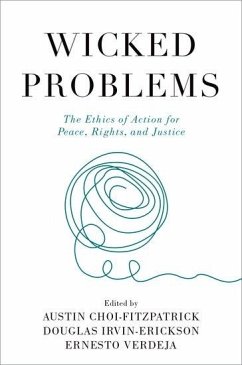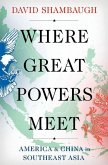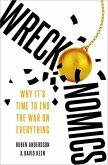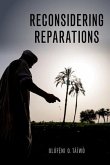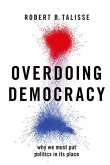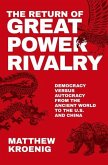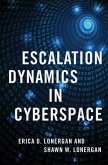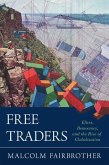Wicked Problems
The Ethics of Action for Peace, Rights, and Justice
Herausgeber: Choi-Fitzpatrick, Austin; Verdeja, Ernesto; Irvin-Erickson, Douglas
Wicked Problems
The Ethics of Action for Peace, Rights, and Justice
Herausgeber: Choi-Fitzpatrick, Austin; Verdeja, Ernesto; Irvin-Erickson, Douglas
- Broschiertes Buch
- Merkliste
- Auf die Merkliste
- Bewerten Bewerten
- Teilen
- Produkt teilen
- Produkterinnerung
- Produkterinnerung
Ethical action requires more than a catch-phrase. While a generation of changemakers and peacebuilders have set out to Be the Change!, a thousand cautionary tales from the frontlines of social, economic, climate, and racial justice work suggest that deep ethical dilemmas don't always have easily actionable answers. Drawing on the lived experiences and real expertise of activists, educators, and researchers, Wicked Problems explores how doing the work--around the world and in one's own community--often requires tough decisions: between peace and justice, revolution and reform, violence and nonviolence, and between means and ends.…mehr
Andere Kunden interessierten sich auch für
![Where Great Powers Meet Where Great Powers Meet]() David Shambaugh (Political Gaston Sigur Professor of Asian StudiesWhere Great Powers Meet31,99 €
David Shambaugh (Political Gaston Sigur Professor of Asian StudiesWhere Great Powers Meet31,99 €![Wreckonomics Wreckonomics]() Ruben Andersson (Professor of Soc Professor of Social AnthropologyWreckonomics22,99 €
Ruben Andersson (Professor of Soc Professor of Social AnthropologyWreckonomics22,99 €![Reconsidering Reparations Reconsidering Reparations]() Olufemi O. Taiwo (Associate Prof Associate Professor of PhilosophyReconsidering Reparations43,99 €
Olufemi O. Taiwo (Associate Prof Associate Professor of PhilosophyReconsidering Reparations43,99 €![Overdoing Democracy Overdoing Democracy]() Robert B. Talisse (W. Alton Jones Professor of Philosophy and ProfeOverdoing Democracy27,99 €
Robert B. Talisse (W. Alton Jones Professor of Philosophy and ProfeOverdoing Democracy27,99 €![The Return of Great Power Rivalry The Return of Great Power Rivalry]() Matthew Kroenig (Profess Professor in the Department of GovernmentThe Return of Great Power Rivalry27,99 €
Matthew Kroenig (Profess Professor in the Department of GovernmentThe Return of Great Power Rivalry27,99 €![Escalation Dynamics in Cyberspace Escalation Dynamics in Cyberspace]() Erica D. Lonergan ( Assistant Professor in the Army Cyber InstituteEscalation Dynamics in Cyberspace34,99 €
Erica D. Lonergan ( Assistant Professor in the Army Cyber InstituteEscalation Dynamics in Cyberspace34,99 €![Free Traders Free Traders]() Malcolm Fairbrother (Prof Professor in the Department of SociologyFree Traders45,99 €
Malcolm Fairbrother (Prof Professor in the Department of SociologyFree Traders45,99 €-
-
-
Ethical action requires more than a catch-phrase. While a generation of changemakers and peacebuilders have set out to Be the Change!, a thousand cautionary tales from the frontlines of social, economic, climate, and racial justice work suggest that deep ethical dilemmas don't always have easily actionable answers. Drawing on the lived experiences and real expertise of activists, educators, and researchers, Wicked Problems explores how doing the work--around the world and in one's own community--often requires tough decisions: between peace and justice, revolution and reform, violence and nonviolence, and between means and ends.
Hinweis: Dieser Artikel kann nur an eine deutsche Lieferadresse ausgeliefert werden.
Hinweis: Dieser Artikel kann nur an eine deutsche Lieferadresse ausgeliefert werden.
Produktdetails
- Produktdetails
- Verlag: Oxford University Press Inc
- Seitenzahl: 288
- Erscheinungstermin: 14. Oktober 2022
- Englisch
- Abmessung: 231mm x 152mm x 19mm
- Gewicht: 450g
- ISBN-13: 9780197632826
- ISBN-10: 0197632823
- Artikelnr.: 63199817
- Herstellerkennzeichnung
- Libri GmbH
- Europaallee 1
- 36244 Bad Hersfeld
- gpsr@libri.de
- Verlag: Oxford University Press Inc
- Seitenzahl: 288
- Erscheinungstermin: 14. Oktober 2022
- Englisch
- Abmessung: 231mm x 152mm x 19mm
- Gewicht: 450g
- ISBN-13: 9780197632826
- ISBN-10: 0197632823
- Artikelnr.: 63199817
- Herstellerkennzeichnung
- Libri GmbH
- Europaallee 1
- 36244 Bad Hersfeld
- gpsr@libri.de
Austin Choi-Fitzpatrick is University Professor at the University of San Diego's Kroc School of Peace Studies. Austin's teaching, scholarship, and public engagement lies at the intersection of social movements, human rights, and new technology. He is the author of What Slaveholders Think and The Good Drone, and has written articles in Slate, Al Jazeera, The Guardian, The Conversation, MIT Reader, Medium, and Aeon. His commentary on current events includes appearances on BBC and Fox News, and his work on drones has been profiled in Science and Fast Company and by NBC, among others. Douglas Irvin-Erickson is Assistant Professor at the Jimmy and Rosalynn Carter School for Peace and Conflict Resolution, George Mason University. He is the author of Raphaël Lemkin and the Concept of Genocide, and many articles on human rights, international criminal law and legal history, genocide, and peace. Irvin-Erickson directs the Raphaël Lemkin Genocide Prevention Program at the Carter School, is a Senior Fellow with the Alliance for Peacebuilding, a Board Member of the Institute for the Study of Genocide, and a member of the editorial board of Genocide Studies and Prevention. He lectures widely and works with governments, international organizations, and NGOs around the world. Ernesto Verdeja is Associate Professor of Political Science and Peace Studies at the Kroc Institute for International Peace Studies, University of Notre Dame. He researches contemporary genocide and mass atrocities, and political justice and reconciliation after violence. He has worked for a variety of human rights organizations and is the Executive Director of the non-profit Institute for the Study of Genocide. Ernesto regularly consults with governments and non-governmental organizations on mass atrocity prevention and reconciliation efforts.
* Acknowledgments
* Contributors
* Introduction: Wicked Problems - The Ethics of Action for Peace,
Rights, and Justice
* Austin Choi-Fitzpatrick, Douglas Irvin-Erickson, and Ernesto Verdeja
* I: VIOLENCE
* 1. The Ritual of Black Armed Resistance: Police Abolition through the
Eyes of the Black Radical Tradition
* Tony Gaskew
* 2. Building a Movement to End Poverty through Nonviolent Resistance
* Liz Theoharis and Noam Sandweiss-Back
* 3. Is Violence the Answer? A Pragmatic Approach
* Kirssa Cline Ryckman
* 4. How Is It to Be Done? Dilemmas of Prefigurative and Harm -
Reduction Approaches to Social Movement Work
* Ashley J. Bohrer
* II: LEADERSHIP AND ORGANIZATIONS
* 5. The Paradox of Survivor Leadership
* Minh Dang
* 6. Allies Out Front: Dilemmas of Leadership
* Daniel J. Myers
* 7. Organizing Dilemmas across U.S.- Based Social Justice Movement
Spaces
* alicia sanchez gill
* 8. The Ones Who Walk Away to Stay and Fight
* Philip Gamaghelyan
* 9. From Righteous to Responsive: Rethinking the Role of Moral Values
of Peacebuilding
* Reina C. Neufeldt
* III: SYSTEMS AND INSTITUTIONS
* 10. Dilemmas in Action Where Rule of Law Conflicts with Justice
* Deena R. Hurwitz
* 11. Establishing an Ethics of Post-Sanctions Peacebuilding
* George A. Lopez and Beatrix Geaghan-Breiner
* 12. Threading the Needle: Ethical Dilemmas in Preventing Mass
Atrocities
* Ernesto Verdeja
* 13. Whither the Villains? The Ethical Dilemma in Armed Conflict
* Laurie Nathan
* 14. "A Different Kind of Weapon": Ethical Dilemmas and Nonviolent
Civilian Protection
* Felicity Gray
* 15. The Ethics of Transitional Justice
* Tim Murithi
* 16. Why the Peacebuilding Field Needs Clear and Accessible Standards
of Research Ethics
* Elizabeth Hume and Jessica Baumgardner-Zuzik
* 17. Consent, Inclusivity, and Local Voices: Ethical Dilemmas of
Teaching Peace in Conflict Zones
* Agnieszka Paczynska and Susan F. Hirsch
* Bibliography
* Index
* Contributors
* Introduction: Wicked Problems - The Ethics of Action for Peace,
Rights, and Justice
* Austin Choi-Fitzpatrick, Douglas Irvin-Erickson, and Ernesto Verdeja
* I: VIOLENCE
* 1. The Ritual of Black Armed Resistance: Police Abolition through the
Eyes of the Black Radical Tradition
* Tony Gaskew
* 2. Building a Movement to End Poverty through Nonviolent Resistance
* Liz Theoharis and Noam Sandweiss-Back
* 3. Is Violence the Answer? A Pragmatic Approach
* Kirssa Cline Ryckman
* 4. How Is It to Be Done? Dilemmas of Prefigurative and Harm -
Reduction Approaches to Social Movement Work
* Ashley J. Bohrer
* II: LEADERSHIP AND ORGANIZATIONS
* 5. The Paradox of Survivor Leadership
* Minh Dang
* 6. Allies Out Front: Dilemmas of Leadership
* Daniel J. Myers
* 7. Organizing Dilemmas across U.S.- Based Social Justice Movement
Spaces
* alicia sanchez gill
* 8. The Ones Who Walk Away to Stay and Fight
* Philip Gamaghelyan
* 9. From Righteous to Responsive: Rethinking the Role of Moral Values
of Peacebuilding
* Reina C. Neufeldt
* III: SYSTEMS AND INSTITUTIONS
* 10. Dilemmas in Action Where Rule of Law Conflicts with Justice
* Deena R. Hurwitz
* 11. Establishing an Ethics of Post-Sanctions Peacebuilding
* George A. Lopez and Beatrix Geaghan-Breiner
* 12. Threading the Needle: Ethical Dilemmas in Preventing Mass
Atrocities
* Ernesto Verdeja
* 13. Whither the Villains? The Ethical Dilemma in Armed Conflict
* Laurie Nathan
* 14. "A Different Kind of Weapon": Ethical Dilemmas and Nonviolent
Civilian Protection
* Felicity Gray
* 15. The Ethics of Transitional Justice
* Tim Murithi
* 16. Why the Peacebuilding Field Needs Clear and Accessible Standards
of Research Ethics
* Elizabeth Hume and Jessica Baumgardner-Zuzik
* 17. Consent, Inclusivity, and Local Voices: Ethical Dilemmas of
Teaching Peace in Conflict Zones
* Agnieszka Paczynska and Susan F. Hirsch
* Bibliography
* Index
* Acknowledgments
* Contributors
* Introduction: Wicked Problems - The Ethics of Action for Peace,
Rights, and Justice
* Austin Choi-Fitzpatrick, Douglas Irvin-Erickson, and Ernesto Verdeja
* I: VIOLENCE
* 1. The Ritual of Black Armed Resistance: Police Abolition through the
Eyes of the Black Radical Tradition
* Tony Gaskew
* 2. Building a Movement to End Poverty through Nonviolent Resistance
* Liz Theoharis and Noam Sandweiss-Back
* 3. Is Violence the Answer? A Pragmatic Approach
* Kirssa Cline Ryckman
* 4. How Is It to Be Done? Dilemmas of Prefigurative and Harm -
Reduction Approaches to Social Movement Work
* Ashley J. Bohrer
* II: LEADERSHIP AND ORGANIZATIONS
* 5. The Paradox of Survivor Leadership
* Minh Dang
* 6. Allies Out Front: Dilemmas of Leadership
* Daniel J. Myers
* 7. Organizing Dilemmas across U.S.- Based Social Justice Movement
Spaces
* alicia sanchez gill
* 8. The Ones Who Walk Away to Stay and Fight
* Philip Gamaghelyan
* 9. From Righteous to Responsive: Rethinking the Role of Moral Values
of Peacebuilding
* Reina C. Neufeldt
* III: SYSTEMS AND INSTITUTIONS
* 10. Dilemmas in Action Where Rule of Law Conflicts with Justice
* Deena R. Hurwitz
* 11. Establishing an Ethics of Post-Sanctions Peacebuilding
* George A. Lopez and Beatrix Geaghan-Breiner
* 12. Threading the Needle: Ethical Dilemmas in Preventing Mass
Atrocities
* Ernesto Verdeja
* 13. Whither the Villains? The Ethical Dilemma in Armed Conflict
* Laurie Nathan
* 14. "A Different Kind of Weapon": Ethical Dilemmas and Nonviolent
Civilian Protection
* Felicity Gray
* 15. The Ethics of Transitional Justice
* Tim Murithi
* 16. Why the Peacebuilding Field Needs Clear and Accessible Standards
of Research Ethics
* Elizabeth Hume and Jessica Baumgardner-Zuzik
* 17. Consent, Inclusivity, and Local Voices: Ethical Dilemmas of
Teaching Peace in Conflict Zones
* Agnieszka Paczynska and Susan F. Hirsch
* Bibliography
* Index
* Contributors
* Introduction: Wicked Problems - The Ethics of Action for Peace,
Rights, and Justice
* Austin Choi-Fitzpatrick, Douglas Irvin-Erickson, and Ernesto Verdeja
* I: VIOLENCE
* 1. The Ritual of Black Armed Resistance: Police Abolition through the
Eyes of the Black Radical Tradition
* Tony Gaskew
* 2. Building a Movement to End Poverty through Nonviolent Resistance
* Liz Theoharis and Noam Sandweiss-Back
* 3. Is Violence the Answer? A Pragmatic Approach
* Kirssa Cline Ryckman
* 4. How Is It to Be Done? Dilemmas of Prefigurative and Harm -
Reduction Approaches to Social Movement Work
* Ashley J. Bohrer
* II: LEADERSHIP AND ORGANIZATIONS
* 5. The Paradox of Survivor Leadership
* Minh Dang
* 6. Allies Out Front: Dilemmas of Leadership
* Daniel J. Myers
* 7. Organizing Dilemmas across U.S.- Based Social Justice Movement
Spaces
* alicia sanchez gill
* 8. The Ones Who Walk Away to Stay and Fight
* Philip Gamaghelyan
* 9. From Righteous to Responsive: Rethinking the Role of Moral Values
of Peacebuilding
* Reina C. Neufeldt
* III: SYSTEMS AND INSTITUTIONS
* 10. Dilemmas in Action Where Rule of Law Conflicts with Justice
* Deena R. Hurwitz
* 11. Establishing an Ethics of Post-Sanctions Peacebuilding
* George A. Lopez and Beatrix Geaghan-Breiner
* 12. Threading the Needle: Ethical Dilemmas in Preventing Mass
Atrocities
* Ernesto Verdeja
* 13. Whither the Villains? The Ethical Dilemma in Armed Conflict
* Laurie Nathan
* 14. "A Different Kind of Weapon": Ethical Dilemmas and Nonviolent
Civilian Protection
* Felicity Gray
* 15. The Ethics of Transitional Justice
* Tim Murithi
* 16. Why the Peacebuilding Field Needs Clear and Accessible Standards
of Research Ethics
* Elizabeth Hume and Jessica Baumgardner-Zuzik
* 17. Consent, Inclusivity, and Local Voices: Ethical Dilemmas of
Teaching Peace in Conflict Zones
* Agnieszka Paczynska and Susan F. Hirsch
* Bibliography
* Index

